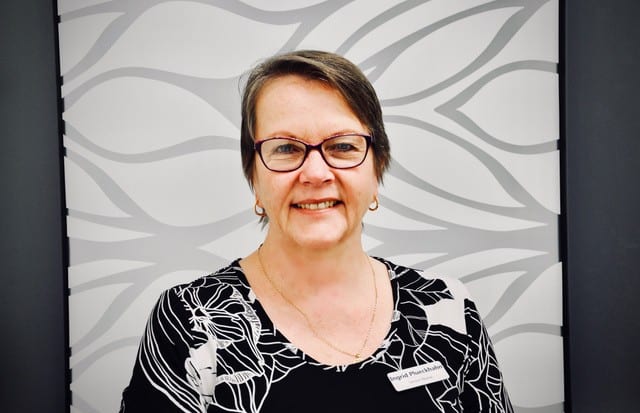
Background
Ingrid Plueckhahn is a Registered Nurse, with Post Graduate Degrees in Master of Public Health, Grad Dip (Cancer Nursing and Palliative Care) and B. Health Science (post registration). Currently employed at Peter MacCallum Cancer Centre as an Advanced Practice Nurse, has experience within a variety of roles including Nurse Unit Manager and Practice Development Nurse for the Lung, Head & Neck inpatient Units.
She is currently the lead Tobacco Treatment Specialist Nurse Consultant and project led the hospital to become the first Melbourne metropolitan hospital to become Totally Smoke Free in 2007. She has provided guidance and policy assistance to several Victoria and interstate hospitals which have followed suit. She established a nurse led Smoking Cessation Clinic in 2009 where she continues to provide smoking cessation support to cancer patients, family members and staff.
She has engaged Peter MacCallum Cancer Centre as a key member of the Victorian Network for Smokefree Health Services since 2012. She has received
- Jen Rusden Memorial Prize – Awarded for service to cancer nursing and commitment to patient care
- High Commendation – Victorian Public Health Care Award in 2006 for outstanding individual achievement in establishing hospital based Smoking cessation support for cancer patients
She contributed to the writing of the first edition of NHMRC Guidelines for Lung Cancer, is published in the Australian Journal of Cancer Nursing and Internal Medicine Journal on Smoking cessation in Cancer patients, has presented and been an invited key note speaker to several national and international cancer conferences in Australia, China and USA on the topic of Smoking Cessation Support for Cancer patients. She has co investigated studies in Smoking cessation and cancer patients at Peter Mac. She is an invited co-investigator on an open Victorian Cancer Agency research project.
As a Remote Area Nurse, she worked in very remote Indigenous communities in the Northern Territory in Aboriginal Medical Service primary health and emergency care clinics. She has provided multiple education sessions to Aboriginal Health Care Professionals on Smoking cessation and early cancer detection through EdCan and Quit Victoria.
Ingrid was a Quit Victoria Health Professional Educator and a Quit Line specialist for several years where she provided education nationally, to a variety of Health Professionals. She is a current member of Cancer Nurses Society of Australia (CNSA), and a Full Member (Clinical) of the Australian Association of Smoking Cessation Professionals (AASCP). She is an invited member on the Pfizer Medical Advisory Board on Smoking Cessation and Reconciliation Action Plan.
Presentation Summary
Quitting Smoking
Ingrid Plueckhahn
Tobacco Treatment Specialist Nurse
Peter MacCallum Cancer Centre, Melbourne
Many patients, newly diagnosed with a head & neck cancer, understand the link between tobacco smoking and a cancer diagnosis. However, not all will be aware of the importance of stopping smoking to get the best benefit from their cancer treatment.
Nearly a third of people who smoke, continue to smoke even after they are diagnosed. This has a direct effect on their overall health and even their survival. The rate of survival of cancer patients who continue to smoke is up to 35% lower compared to patients who stop smoking (van Imhoff, et al, 2015).
There have been numerous studies that inform us that patients with a head and neck cancer who stop smoking will withstand the effects of treatment more effectively, have fewer days where they are not well enough to have treatment, have fewer side effects, and have better survival rates. Stopping smoking will not only reduce their risk of the recurrence of their cancer, but it also reduces their chance of getting another smoking-related cancer.
More clinicians are enquiring about a patient’s smoking status. But this is not enough! We need to be actively assisting patients to quit smoking to help them achieve the best single thing they can contribute to their health and survival.
So how do you quit?
Firstly, just knowing how quitting smoking can benefit your head and neck cancer diagnosis is a good start. When you quit, your risks with surgery and anaesthesia are lowered, your recovery and healing from surgery are better, your chemotherapy and radiation treatment may be more effective, your food tastes better and you increase your ability to maintain your weight during treatment, and you also have decreased levels of pain and respond better to pain medication. You’ll also have more money in your pocket, exercise easier, and improve your circulation and breathing. Making the decision to quit is the first step you can make.
Secondly, clinicians have a responsibility to provide you with quitting support and to commence quitting medications to assist you. They can prescribe either medications via tablets, or suggest Nicotine Replacement Therapy (NRT) which may be patches, gum, spray, inhalator or lozenge, or a combination of these. Their value lies in you using them as prescribed and for at least two to three months, or longer. The tablets and patches are available on the PBS, which is cost effective for you, and some health facilities also fund the oral forms of NRT for their patients.
Thirdly, it is critical to develop strategies to reduce your opportunities and access to smoking, by changing habits and behaviours. Make your home and car completely smoke free; change your morning routine to start with a non-caffeinated drink; consider having breakfast, a short walk or shower, or attend to your mouth care – rather than reaching for a cigarette. Throw away ashtrays and lighters; avoid buying cigarettes or store them in a ‘harder to get to’ location, such as your laundry cupboard or car boot. Avoid or reduce your intake of caffeinated or alcoholic drinks to break the strong association. Try to make your phone calls inside to change the ‘phone and cigarette’ connection.
Finally, adjust your thinking – learn to relax by deep breathing, exercising, and taking an interest in an activity which you find brings you relief from boredom. Play music, read, talk to friends, eat healthy snacking, have a daily walk and keep well hydrated. This all helps.
Stay in contact and keep talking about quitting with your health care provider on a regular basis and continue to develop strategies – a tool box of skills – to help you quit.
